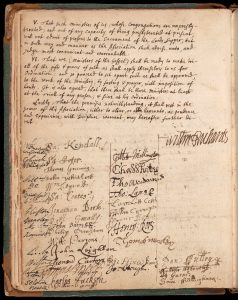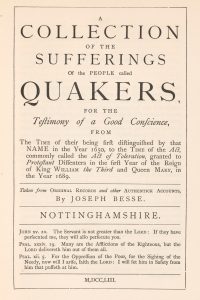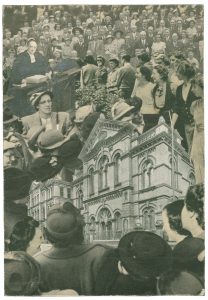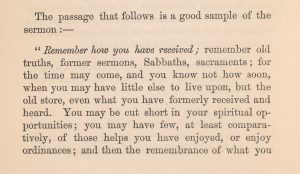December 1, 2021, by Kathryn Summerwill
Beyond the Mayflower: nonconformist churches
Our new exhibition ‘Beyond the Mayflower’ is now open at the Weston Gallery, Lakeside Arts. The exhibition goes beyond the story of the ‘Pilgrim Fathers’ to look at the nonconformist churches established by people with similar views who chose to remain in Nottinghamshire.
As seen in a previous blog post, the archive of the Archdeaconry of Nottingham contains hundreds of presentment bills naming local people who demonstrated behaviours or views that suggested they were Puritans (wishing to improve the Church of England from within) or Separatists (wishing to leave the church altogether and form their own congregations).

Signatures of members of the Nottingham Presbyterian Classis minute book (High Pavement Collection, Hi 2 M 1)
The records of the Archdeaconry court cease in 1643. During the revolutionary times of the English Civil War and Commonwealth period, the old order was abolished. In 1645 Presbyterian churches were established in England. The Rev. John Whitlock was the Presbyterian minister of St Mary’s Church in Nottingham, and a founder member of the Nottingham Presbyterian Classis. This was a group which selected and approved local preachers and elders. The classis minute book, a very rare and important survival of this turbulent period of religious history, is displayed in the ‘Beyond the Mayflower’ exhibition in the central case.
However, the victory of the Presbyterians was short-lived. After the restoration of King Charles II in 1660, the old Church of England hierarchy was brought back.
Presbyterian and Independent ministers were ejected from their livings, including Whitlock. He was forced out in 1662 for not reading the Book of Common Prayer. The ‘Beyond the Mayflower’ exhibition includes an extract from a farewell sermon he delivered at St Mary’s on 6 July 1662. He encouraged his parishioners to remember the old ways, and to use those memories as spiritual nourishment through hard times.
The Archdeaconry of Nottingham court began sitting again in 1663. Until 1686 the court assiduously carried on prosecuting people who attended other churches or none. Whitfield continued his ministry illegally in Mansfield, where he and his followers flouted the terms of various harsh Acts such as the Five Miles Act and the Conventicles Acts passed in the 1660s and 1670s.

Copies of warrants of distress against Quakers, 1676, from Percy J. Cropper (ed.), The Sufferings of the Quakers in Nottinghamshire, 1649-1689 (East Midlands Special Collection, Not 1.M75 CRO)
Legislation against nonconformists affected smaller groups such as the Society of Friends (Quakers) as well as the more prominent Presbyterians, Independents or Baptists. The exhibition contains printed copies of warrants of arrest issued against Quakers by Dr Robert Thoroton of Car Colston, a justice of the peace. Nowadays he is better known as an antiquary and historian and the person after whom the Thoroton Society is named.

Collage of photographs of the building and people at Castle Gate Congregational Church, Nottingham, c.1948 (Castle Gate Collection, CU/P/3/34)
After the Act of Toleration in 1689, religious congregations willing to pledge oaths of allegiance and supremacy to the Crown were allowed to meet legally, and began building their own meeting houses. One of the exhibition cases is dedicated to the history of three churches whose historic archives have been deposited with the University of Nottingham: Castle Gate Church and High Pavement Church in Nottingham, and the Old Meeting House in Mansfield. One of the founding members of High Pavement church was the Rev. John Whitlock, who continued to preach there until a few years before his death in 1709.
You can find out more about the nonconformist church collections held at the University of Nottinghamshire on our website.
To accompany the exhibition, there are a series of talks and behind-the-scenes gallery tours. Tickets can be booked through Lakeside Arts Box Office. To see the original archives and rare books, please contact Manuscripts and Special Collections on mss.library@nottingham.ac.uk to make an appointment to visit the Reading Room.
No comments yet, fill out a comment to be the first


Leave a Reply